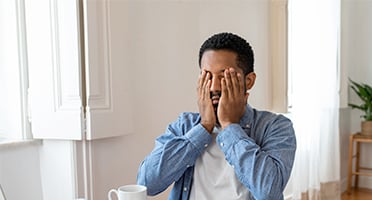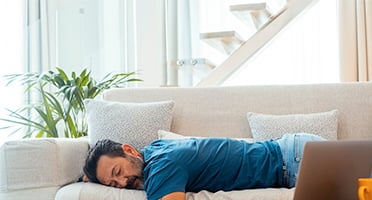Millions of Americans are plagued with poor sleep. Night after night, no matter how exhausted they are, sleep eludes many people, and a blissful night of eight hours of sleep is a rare occurrence. Some people haven’t had a restful night of sleep in their entire adult lives, while others are just now having sleep-related issues for the first time.

If you are one of those people who feel tired when you wake up in the morning, have daytime fatigue and sleepiness, and have difficulty concentrating on tasks at work, you may suffer from a breathing-related sleep disorder such as Obstructive Sleep Apnea. While there are a few different types of sleep apnea, OSA is, by far, the most common.
People with sleep apnea may experience:
- Waking up during the night
- Choking and gasping for air as your body tries desperately to breathe through a collapsed airway
- Snoring
- Dry mouth upon waking
- Morning headache
- Frequent urination (mainly due to the fact that the constant sleep disruptions make you realize you have to relieve yourself)
- Difficulty staying asleep (insomnia)
- Irritability
- Daytime sleepiness/fatigue
- Poor concentration
- Memory problems
- Mood swings
What is Obstructive Sleep Apnea
OSA occurs when your airway becomes so relaxed it collapses. The tissue blockage causes you to choke and gasp for air; it also causes you to stop breathing for several seconds at a time. You may experience breathing cessations hundreds of times each night. You’ll wake up very briefly during these stoppages, though you likely won’t remember doing so.
Regardless of whether or not you remember waking up during your interrupted breathing, you will feel the effects of Obstructive Sleep Apnea the next day. If you have sleep apnea, you likely experience many of those symptoms above.
Alcohol, Snoring, and Sleep Apnea
If you snore, you could have sleep apnea, and if you have sleep apnea, you will likely snore. It’s that simple. If you drink alcohol before bedtime, you may think you’ll sleep better, but alcohol actually exacerbates snoring and sleep apnea.
The physiology of snoring and alcohol’s effect on the body is really much more fascinating than you’d think! Most people understand that alcohol is a depressant rather than a stimulant and that within 10-20 minutes of drinking alcohol, the effects of alcohol occur. Alcohol stays in the body for a very long time—longer than most people realize.
Regardless of how much you drink, it will likely take up to 14 hours for your body to fully rid itself of the alcohol you’ve consumed. As the alcohol makes its way through the human body, muscles relax; muscles inside the mouth and throat relax during sleep anyway, but this relaxation is increased with the use of alcohol.
When the muscles in the throat become more relaxed, you will snore due to the sagging tissues. The more alcohol has relaxed your airway, the louder you will snore. Simply put, snoring is the sound produced when your airway is trying to force oxygen through a blocked passage.
Dangers of Untreated Obstructive Sleep Apnea
If you suspect you have sleep apnea, it’s important to have a sleep study done as soon as possible. You cannot begin sleep apnea treatment without an official diagnosis of Obstructive Sleep Apnea. If you’ve already been diagnosed with OSA, please don’t put off treatment any longer, as this sleep disorder can wreak havoc on your physical health and emotional well-being:
- Sleep apnea can affect cardiovascular health
- Sleep apnea can lead to strokes
- Sleep apnea may cause weight gain
- Sleep apnea affects mood and may lead to anxiety and depression
- Sleep apnea can cause high blood pressure
- Sleep apnea raises the risk of Type II Diabetes
- Sleep apnea can lead to Metabolic Syndrome (which leads to diabetes)
- Sleep apnea can affect your cognitive function
- Sleep apnea puts you at a greater risk of car accidents
- Sleep apnea sufferers are more likely to develop glaucoma
Learn More About Home Sleep Tests for OSA
You can have a two-night sleep study in the comfort of your own home with SleepTest.com. This revolutionary home sleep study technology allows your sleep to be monitored without spending the night in a lab hooked up to wires and machines under the watchful eyes of lab techs.
Please fill out our online contact form or ask your sleep apnea dentist about taking a home sleep test so you can begin sleep apnea treatment as soon as possible.

Feeling tired all the time, even after a full night’s sleep? You might be suffering from sleep apnea. Discover how an at-home sleep test can help diagnose the root cause of your fatigue—and get you back to feeling like yourself.

Spring is here—and so is the pollen. For the millions dealing with seasonal allergies, the symptoms can be more than just annoying. And if you also have sleep apnea, those stuffy nights and restless sleep can get even worse.
Let’s take a closer look at how spring allergies and sleep apnea affect each other—and what steps you can take to sleep more comfortably.




